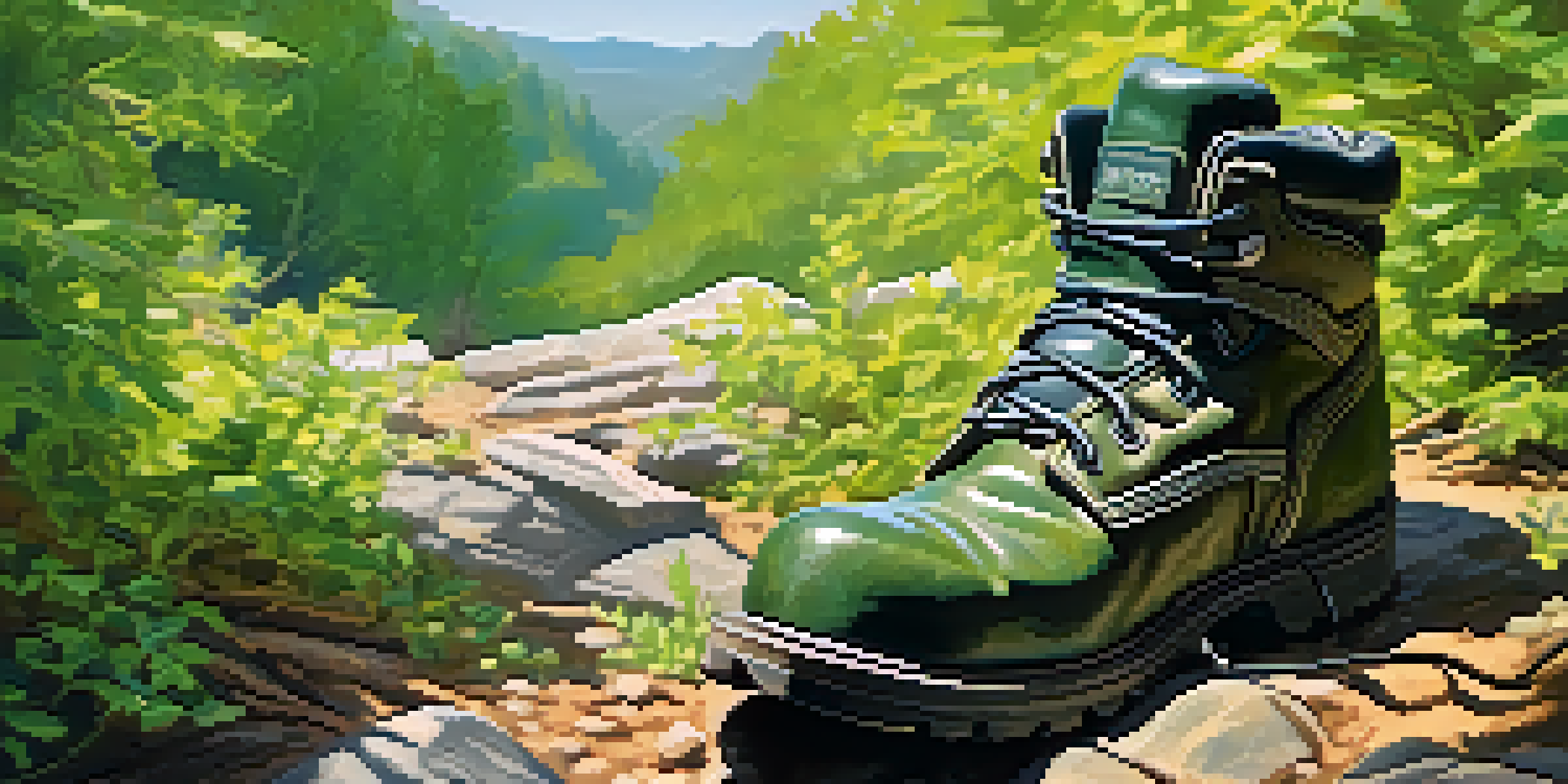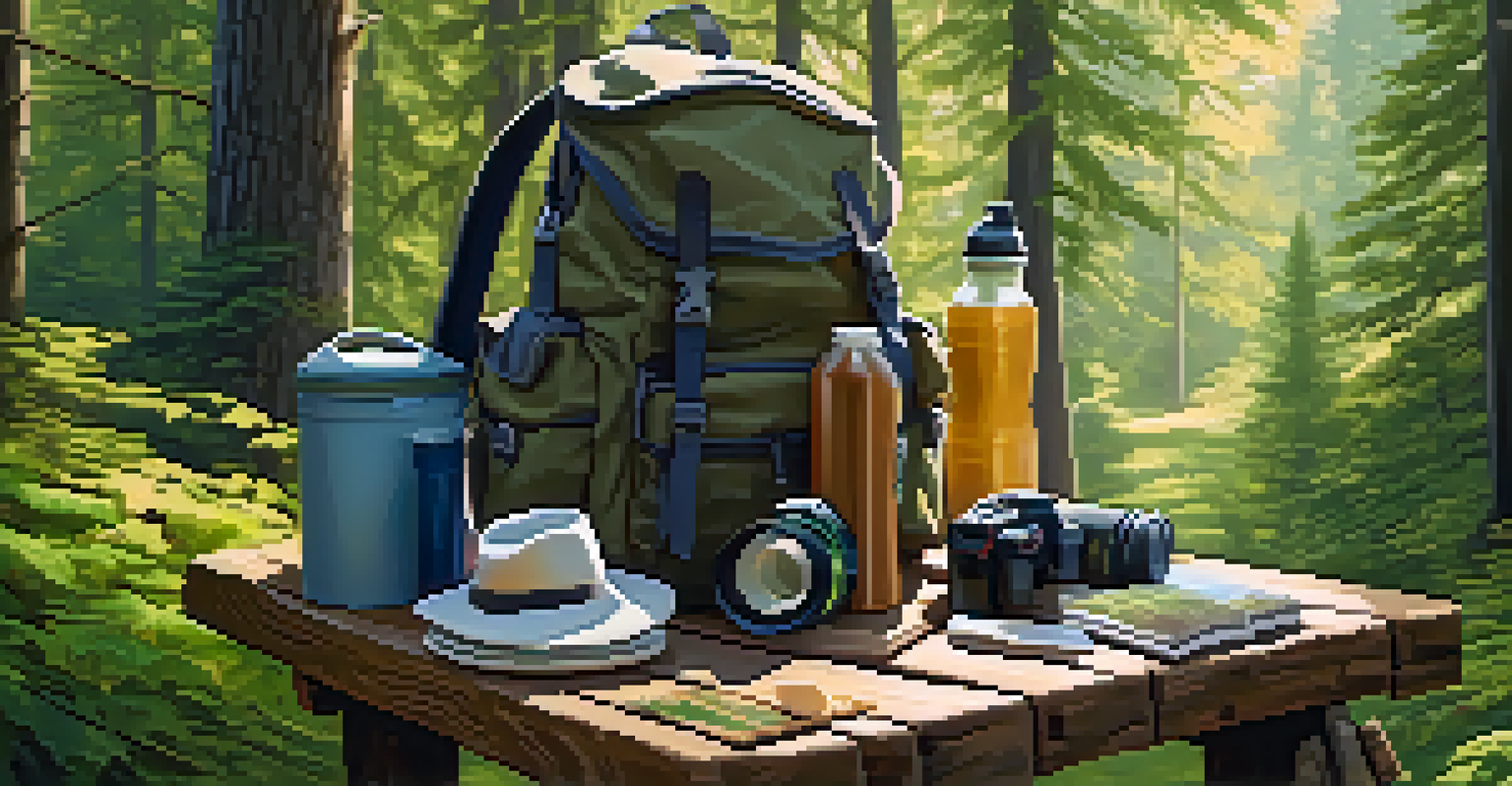Essential Gear for Enjoying Guided Nature Walks and Hikes

Comfortable Footwear: The Foundation of Your Hiking Experience
When it comes to hiking, your choice of footwear can make or break your experience. A good pair of hiking boots or shoes provides the necessary support and traction to navigate various terrains. Think of your feet as the wheels of a car; without the right tires, you won't enjoy the ride.
The journey of a thousand miles begins with one step.
Look for footwear that fits well and is designed specifically for hiking. Features like waterproof materials and breathable fabrics can enhance comfort during long walks. Remember, blisters can quickly turn a pleasant hike into a painful ordeal, so prioritize your foot health.
Additionally, consider breaking in new shoes before your hike. Just like you wouldn’t drive a brand-new car on a long trip, give your footwear some time to adjust to your feet. This will ensure you're ready to tackle the trails with confidence.
Weather-Appropriate Clothing for All Conditions
Dressing for a hike is all about the layers. The weather can change unexpectedly, especially in nature, so it’s wise to wear moisture-wicking base layers, insulating mid-layers, and waterproof outer layers. Imagine peeling off an onion; you want to be able to take layers on and off as needed.

Choose clothing made from materials that will keep you dry and comfortable. Synthetic fabrics or merino wool are great options because they wick moisture away while keeping you warm. Avoid cotton, as it can make you feel damp and cold.
Choose the Right Footwear
Comfortable and well-fitting hiking shoes are essential for a pleasant hiking experience and to prevent injuries.
Don't forget about accessories like hats and gloves, which can protect you from the elements. A lightweight, breathable hat can shield you from the sun, while gloves will keep your hands warm during chilly mornings. With the right clothing, you'll enjoy your hike no matter the forecast.
Hydration: The Key to Staying Energized on the Trail
Staying hydrated during your hike is crucial for maintaining energy and focus. Dehydration can sneak up on you, leading to fatigue and decreased performance. Think of water as fuel for your body; without it, your engine won't run smoothly.
In every walk with nature, one receives far more than he seeks.
Carry a reusable water bottle or a hydration reservoir to keep your water supply handy. Aim to drink regularly, even if you don't feel thirsty. A good rule of thumb is to drink about half a liter of water for every hour of moderate activity.
In addition to water, consider packing electrolyte drinks for longer hikes. These can help replenish essential minerals lost through sweat. Keeping hydrated will enhance your overall hiking experience, allowing you to fully enjoy the beauty around you.
Essential Navigation Tools for a Safe Adventure
Even with a guided tour, having navigation tools can boost your confidence on the trail. A map and compass can provide essential information about the area, while a GPS device can help you track your location. Think of these tools as the road signs guiding you through your journey.
Smartphone apps can also be beneficial, offering features like trail maps and real-time location tracking. Just remember to download offline maps before your hike to avoid losing signal in remote areas. It's like having a personal guide in your pocket!
Layer Your Clothing Wisely
Dressing in layers helps you adapt to changing weather conditions, ensuring comfort throughout your hike.
While guides will lead the way, being familiar with your surroundings enhances your experience. Knowing what to expect on the trail can help you appreciate the beauty of nature even more. So, don’t forget to familiarize yourself with the area before you set off.
First Aid Kits: Be Prepared for Minor Injuries
Accidents can happen, even on the most carefully planned hikes. Packing a small first aid kit is an essential safety measure, ensuring you're prepared for bumps and scrapes. Think of it as your safety net; it’s better to have it and not need it than to need it and not have it.
Your kit should include basic items like adhesive bandages, antiseptic wipes, and pain relievers. Depending on your hiking location, you might also want to include items like insect repellent and sunscreen. These small additions can make a big difference in your comfort.
Remember to familiarize yourself with the contents of your first aid kit. Knowing how to use each item can be just as important as having them on hand. This preparedness can turn a potential setback into a minor inconvenience.
Backpacks: The Perfect Companion for Your Gear
A comfortable backpack is essential for carrying your gear on the trail. Look for one that fits your body well and has adjustable straps. Just as a good suitcase makes travel easier, the right backpack will keep your essentials organized and easily accessible.
Choose a pack with enough capacity to hold everything you'll need for your hike, from water and snacks to a first aid kit. Consider features like ventilation and padding, which can enhance comfort during longer hikes. A well-designed backpack can make your journey more enjoyable.
Stay Hydrated and Energized
Regular hydration and high-energy snacks are key to maintaining your energy and focus while hiking.
Additionally, practice packing your backpack before your hike. This will ensure you've got everything you need and can help distribute weight evenly. A well-packed bag can prevent discomfort and allow you to focus on enjoying the stunning views.
Snacks: Fueling Your Body for the Journey Ahead
High-energy snacks can make a significant difference during your hike. Opt for items that are lightweight, non-perishable, and rich in nutrients. Think of snacks as your hiking fuel—like putting gas in a car before a long drive.
Nuts, granola bars, and dried fruits are excellent choices that provide a quick energy boost. Aim for a mix of carbohydrates, proteins, and fats to keep your energy levels stable. Just as a balanced diet supports overall health, balanced snacks support your hiking stamina.

Don’t forget to pack a little extra in case your hike takes longer than expected. It’s always better to have a few extra snacks on hand than to find yourself hungry on the trail. With the right fuel, you can keep enjoying every step of your adventure.